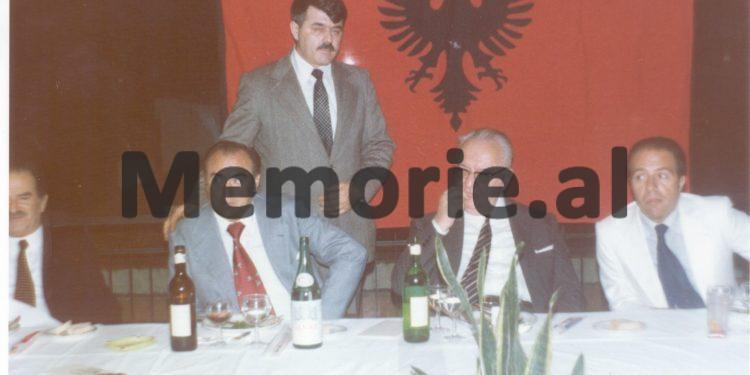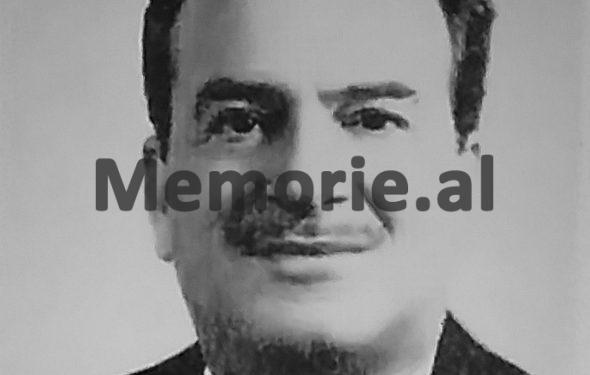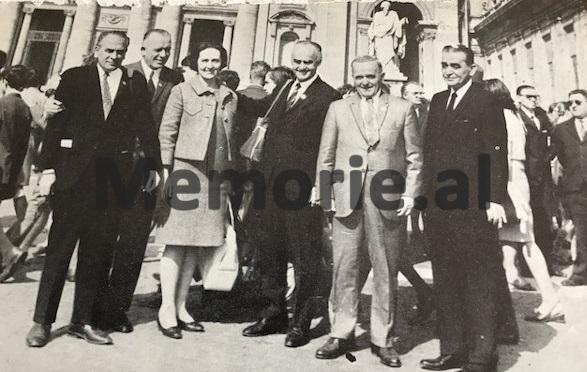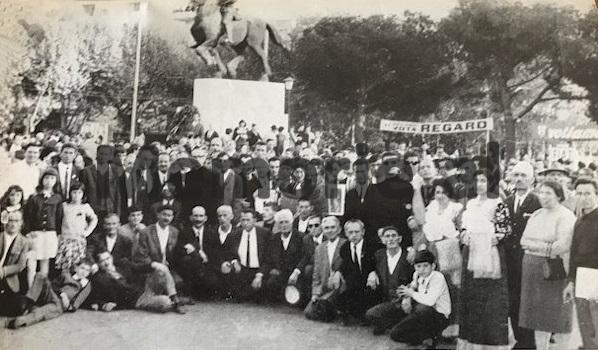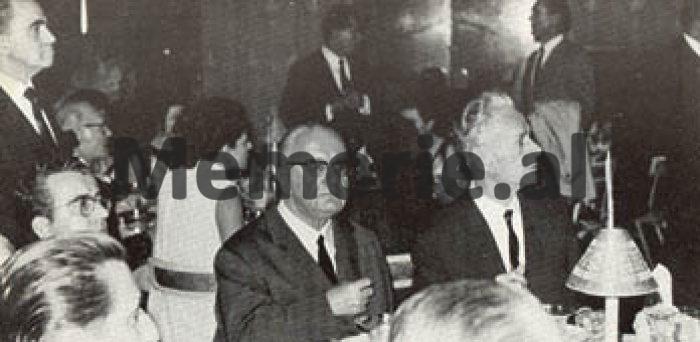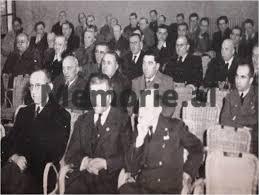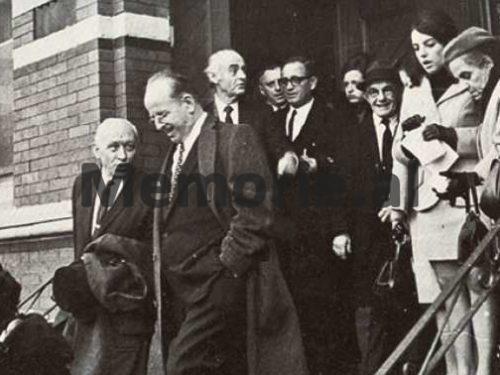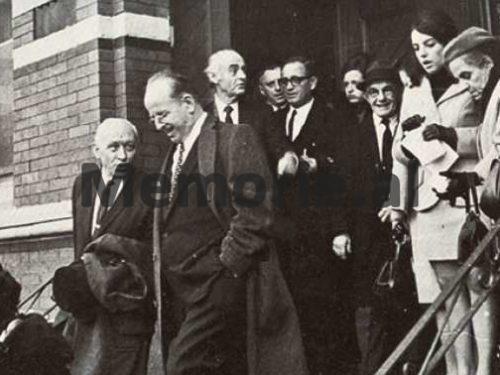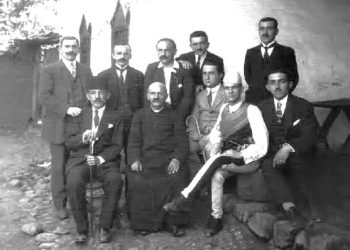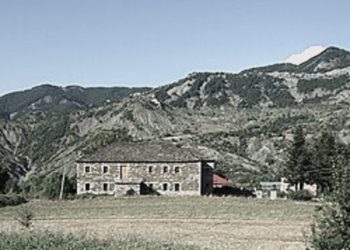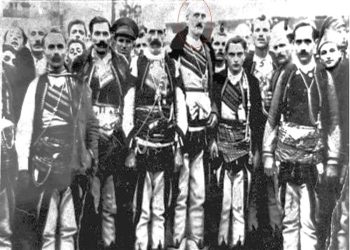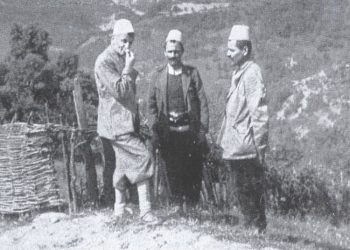Dashnor Kaloçi
Memorie.al publishes the unknown story of two well-known Albanian intellectuals, Professor Namik Resuli from Berat, Mahmut Cungu from Elbasan, who, after receiving scholarships from the government of King Zog, studied and graduated from the most prestigious universities in Italy and Turkey… From Resul’s study and scientific contribution in the field of Albanian language and literature to Italian universities to the brilliant translations of Cung, who worked for years as an engineer in New York City and to the most prestigious US firms, where he was a friend close to the President, Richard Nixon.
During the fifteen-year of the Zog Monarchy, hundreds and hundreds of young Albanians received state scholarships or study rights and graduated from the most prestigious universities in the West. While after receiving the diploma, most of these students returned to Albania and gave their contribution to the recovery and progress of the new Albanian state (both during the period of the Monarchy and during the years of Nazi-fascist occupation of the country), other parts for various reasons did not return to their homeland but stayed in foreign lands, where they continued their research and scientific work.
Two of these famous students and intellectuals were Mahmut Cungu and Namik Resuli, who after 1944, could not return to their homeland, where they had families and relatives. Who were Resuli and Cungu, what was their past, where did they graduate, and what was the contribution of these two famous intellectuals to the Albanian anti-communist diaspora in the West, whose names became known only after the 1990s? ?
In this regard, we are talking about these few lines of this article, which we have prepared based on some of the publications of the Albanian anti-communist diaspora (before the ’90s), which from time to time reminded Resuli and Cungu, highlighting their valuable contribution to the fields where they studied and worked.
Namik Resuli and his research work
Namiku Resuli was born in the city of Berat on September 10, 1912. After completing his primary education in Albania, he was sent to study in Italy, where he graduated from the Lyceum, and then higher education, graduating in Glotology, near the University of Turin. During those years when Resuli studied at that university, he was under the patronage of the famous Italian master, Professor Bartoli, who dealt only with excellent students. The thesis that Resuli defended in his dissertation was: “Studies on stratifications in the Albanian language”. After completing his university studies in Turin, he returned to his homeland where he was appointed professor in the high school of the “Normal” School of Elbasan. But a year later, he was transferred to the Shkodra gymnasium. After serving for some time in Shkodra, he was transferred to the Tirana Gymnasium, and in April 1939, he was sent to Italy as an assistant professor of the Albanian language at the University of Rome.
He remained in this position for ten years and at the same time he was appointed Superior Inspector at the Ministry of Education in Tirana, where he stayed for four years, until 1944. In 1955 Namik Resuli received the scientific degree (“Libera docenza”). in Albanian Language and Literature and was appointed in charge of the Albanian language at the Oriental University Institute of Naples. In this institute he was also charged with various studies in the field of Illyrian Philology. In 1935 Resuli wrote a study on the principles and methods of neurolinguistics, which was published in the magazine “Leka” published in Shkodra. When he returned to Albania, he immediately realized that the linguistic and historical-literary fields were completely undeveloped.
Albanian teachers faced great difficulties and, above all, they had a unified language. Albanian writers of the time wrote in two different dialects, often mixed, without a specific spelling. In the historical-literary field, the situation was also miserable, so much so that a text of the history of Albanian literature was missing. Before such a situation, he focused his activity on two specific objectives: linguistic and literary. In the linguistic field, given that there was still no mature state for choosing one of the two dialects as a national language (at the time no one thought such a problem could be solved with a government decree as it happened later), he tried to bring Tosk Albanian as close as possible to Gegharkunik, especially where these dialects merged. At that time Resuli wrote several articles and studies, such as; “Gegënishtja or toskërishtja?”, “Ancient and new efforts for a common Albanian language”, “For a common language”, etc.
These studies resonated at the time and provoked many reactions and controversies. They left traces that appear in the formulation of the current literary language, but of course they opened the door for him to the Albanian spelling commission, which was established at the Ministry of Education in Tirana. In addition to his studies in these fields, Namik Resuli never devoted himself to journalism, which he started at a very young age, writing in various newspapers and magazines.
Resuli’s contribution to literature
In the literary field, as he says in the article “Four hundred years of Albanian literature”, in the period of the ’30s, in the Albanian language there was only one manual of the Franciscan Justin Rrota, and in Italian, we had the monumental work of Gaetano Petrota. , “Popolo, lingua e Litterature Albanese”. This work of Petrota constituted an irreplaceable source of valuable and precise knowledge on the Albanian people, language and literature, but it cannot be said that it was a true history of Albanian literary history.
At that time a framing was needed, a periodization of all Albanian literary production, from the beginning to 1940. This had to be done with a study of each author based on the importance of his cultural-literary activity in the general framework of literary development. his time and on the based of the importance of the work as a literary production, to assign him the right place to which he belonged. Having these goals, Resuli published the study “Cultural and literary development in Albania from the fifteenth century to the twentieth century.” This study came out in a separate volume published by the Ministry of Education on the occasion of the 25th anniversary of Independence. However, this topic was addressed later, in a more complete way in the study: “On a methodical division of Albanian literary production”, which appeared in the magazine “National School” in 1937. At the same time, Resuli made known to the public widely all-Albanian, some of the old Albanian writers, especially the Catholic ones, noting their invaluable qualities as authors and patriots, who had until then been completely forgotten due to the religious content of their works.
In 1939, Resuli published a collection of De Rada’s most beautiful poems, Milosao. At that time, everyone was talking and talking about the great Arbëresh poet, but few were able to read even his masterpiece because De Rada’s works were not only found in Italian libraries, but also the National Library of Tirana. In 1940 Resuli was commissioned by the Ministry of Education to compile a work in the form of literary history and anthology. Which he accomplished by publishing a work in two volumes (a total of 915 pages), entitled “Albanian Writers”.
He invited the best scholars and writers of the time to participate in this work, but the introductions and the division of Albanian literature in different periods, as well as most of the monographs of the first volume, were by Resuli. In 1940, when the Institute of Albanian Studies (at the Academy level) was founded in Tirana, Namik Resuli was one of the members of that Institute, which was tasked with preparing a new edition of Buzuk’s Meshar.
Studies on Naim, Fishta, and Noli
The events of World War II, and especially those after the war, interrupted Namik Resuli, even temporarily, his scientific and literary activity. But in 1948, with the establishment of the International Center for Albanian Studies at the Faculty of Letters at the University of Palermo, he was invited to become an effective member, and there he presented a study on the homeland of Buzuk’s origin.
After that, Resuli presented other studies, such as: “The importance of Italian-Albanian dialects for the study of Albanian linguistic history”, “Herezira in Meshari e Buzukut”, “Zef Skiroi between two literatures”, “Skanderbeg’s face in the Deradian poem” “Scanderbeccu i pafaan”, “Contribution of Italian Missionaries for the development of Albanian culture”, etc. In 1954, Resuli began publishing the magazine “Albanian Spirit” in Turin. He then published two small volumes “I piu antichi testi albanesi” and “Vocabolarietto di Arnold von Harff”, as well as a study in Albanian entitled “Naim Frashëri poet of goodness”.
In 1958 Namik Resuli integrally published “Meshar” by Gjon Buzuku, with a preface and a critical part. In October 1966, he participated in the International Congress of the Romanian Academic Society, held in Salamanca, with the report “Chronology of Albanian dialects about to with the Albanian-Romanian symbiosis”. After that, in 1959, he was invited to New York at the International Seminar of the Pan-Albanian Federation of America, organized by the Vatra Association.
There, Resuli presented the report “The Actuality of Naim”, in which he explained a point of view until then left behind, that of the religious side of Naim. In 1971 he was invited to commemorate the great Franciscan poet, George Fishta, at the Antonian Atene in Rome, on the occasion of the centenary of the poet’s birth. Namik’s long aloofness, held in Italian, was published in part in Albanian in the newspaper “Flamuri” and, in its entirety, in the Albanian and English versions, in the newspaper “Dielli” in Boston. He also reported on Fishta, “Strutture Nella Poesia di Fishta”, at the VII meeting of the International Center for Albanian Studies in Palermo.
In 1963, Namik Resuli published (in the series “Universal Letteratura”) the work “Storia Della Lestteratura Albanese” and “Antologia della letteratura Albanese”. In 1976, Resuli was invited back to New York by the Vatra Society, where he delivered the “Faik Konica on the 100th anniversary of his birth.” After that, in 1982, he was again invited by “Vatra” to commemorate Fan Stilian Noli. His study entitled “Fan S. Noli today”, which he held on the occasion of the 100th anniversary of Noli’s birth, as well as the one on Faik Konica, was published by “Vatra” and constitute a very valuable contribution of Namik Resuli for recognition of these two faces of the Albanian nation.
In the last years of his life, Namik Resuli had in print an Albanian grammar, the most extensive and complete work of its kind (a total of 620 pages), which he tried to put into circulation with his life. Namik Resuli is mentioned in all the histories of Albanian Literature, such as Gaetano Petrotta, Maximilian Lambertz, Stuart Mann, as well as among the Albanian writers mentioned in P.E.N.’s “Arena” magazine. Club. With the death of Namik Resuli, on September 12, 1984, the history of Albanian Literature, and especially the science of Albanian linguistics, lost one of the most valuable elements that are difficult to replace.
Who was Mahmut Cungu?
Mahmut Cungu was born in the city of Elbasan on May 23, 1913, whence the origin of his family. After finishing primary school in his hometown, he came to Tirana wherein 1932 he graduated with great results from the American “Technical” school of Harry Fultz. He then went to Turkey and in 1940, completed his studies at the Robert College in Istanbul, where he received the title of Engineer. In 1943, Mahmut Cungu returned to Albania, where after staying for some time with his brother, Professor Ali Cungu (one of the most famous English translators of the time), he left his hometown again and went to Turkey.
In 1944, Mahmut married a girl from the famous Xhixhi (Çoçoli) tribe of Tirana, named Khadija, who was the granddaughter of Baba Syrriu who served in the Bektashi Teqe of Cairo in Egypt. Khadija had three other brothers, named Lumo, Arbnor and Ilir, who years later took part in the Vietnam War. After Mahmut Cungu stayed in Istanbul for some time, he left again for some Middle Eastern countries, such as Egypt, Syria, etc. In these states he practiced engineering, working in the construction of various works with several western firms.
In 1961, he left the Middle East, where he worked for nearly 15 years and moved to the United States. Since Cungu knew and mastered English very well, he immediately obtained the necessary permission to practice the profession by passing the relevant exams. After settling in the US, Mahmuti worked for some time in Colorado and Arizona, in his engineering career, with several major industrial firms. Mahmut then returned to New York City where he worked as an engineer in the City Hall of that city and then for 15 years he worked as a civil engineer in Nassau County, LI. Although he stayed in exile in foreign lands for almost 50 years, Mahmuti spoke and wrote the Albanian language very well. He was a man of great humor, and throughout his life away from home, he maintained the customs and traditions of his homeland.
Mahmut Cungu against the communists
Although he was an engineer by profession, Mahmuti was constantly involved in various translations from English to Albanian, publishing from time to time in the Albanian diaspora press. He had a poetic flair and freedom of expression in both Albanian and English. At that time, he translated into literary language Naim Frashëri’s masterpiece, “Livestock and Agriculture”, which was started in Tirana by his brother Ali Cungu.
In 1964, Mahmut published a nearly sixty-page monograph in Egypt, entitled Democracy or Dictatorship. There Mahmuti described how democracy was defined, putting freedom of speech, the press, religion, freedom of movement and the elimination of fear first and foremost. The whole book was a slap in the face to the communist regime in Tirana, where his family lived and was persecuted.
In that book, among other things, he wrote: “The misfortune is that although our communists talk so much about the rights of the Nation, the very interpretation they give to independence, freedom, justice, and democracy is one that deprives the people of these rights… For the Communists, National Independence wants to say union with the Slavic people (1946), Freedom, their undeniable right to think like them, and not as the right of those who think differently. Justice, to kill and imprison opponents of the communist system, and, finally, democracy, they call that form of government run by a single party: the Communist Party, from which both parliament and government emerge.
Translating Roza Luxembourg, Mahmut wrote: “Freedom enjoyed only by government supporters, only by members of one party, is not freedom. Freedom is freedom always and only when it is enjoyed by the one who thinks differently. Not because of any fanatical idea of ”Justice”, but because everything useful, good, and diverse originates from this and its importance disappears when freedom becomes the privilege of a party.
In that book, Mahmuti also criticized the dictatorship of the Communists disguised under the guise of the National Liberation War and did not hesitate to criticize some mistakes from the time of the Zog Monarchy or that of the Nazi-fascist occupation of Albania. In that book there was also an appendix where he showed in detail the Mukje Meeting held in the autumn of 1943, between the communists, ballists and legalists, an agreement which was unilaterally broken by Enver Hoxha, pushed by two the Yugoslav emissaries who stood by him.
Cungu, a friend of President Nixon
Mahmut Cungu in 1976 ran for the post of director of the Vatra Association and then he was elected President of the Albanian Islamic Center of America, where he tried to make a complete reform and good administration of cult objects in the United States… Mahmut then took an active part in the Republican Party of America, serving regularly in some of its assemblies in Boston, Philadelphia, Washington, etc.
During that time he was also invited to the White House by President Nixon, who thanked him for his contribution to the Republican Party. After a long illness in his youth, Mahmut Cungu passed away on August 14, 1983, at a Long Island University Hospital in New York City, where he and his wife, Gigi, and three others were killed. boys, were found near and many of the friends, friends and other personalities of the Albanian diaspora living in the USA.
Memorie.al




